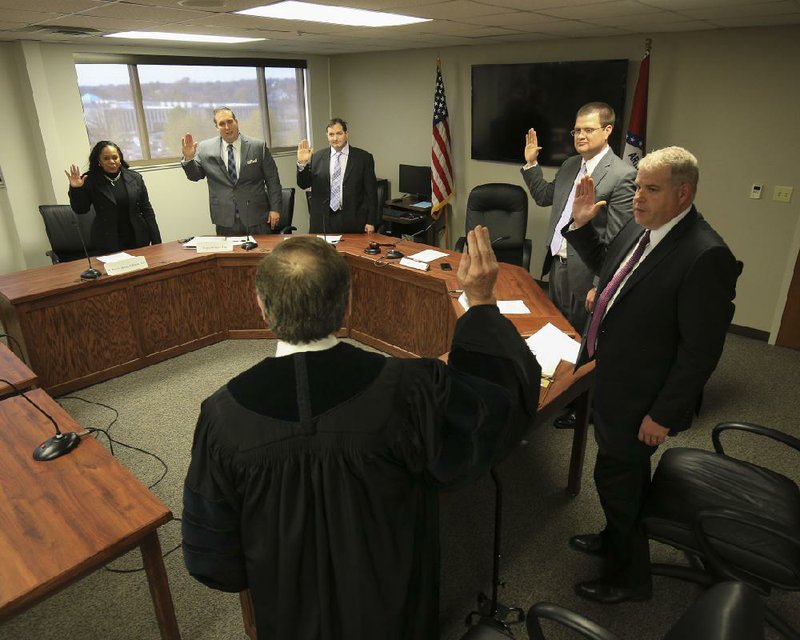When the newly formed Medical Marijuana Commission met for the first time on Monday, about 100 people watched as members made their first three decisions.
The commission exists to figure out how to license medial marijuana dispensaries and growers. It was set up by the Arkansas Medical Marijuana Amendment, which voters approved last month.
Without discussion, commissioners elected Dr. Ronda Henry-Tillman of Little Rock to serve as chairman. She's a surgical oncologist specializing in breast cancer at the University of Arkansas for Medical Sciences and was Gov. Asa Hutchinson's pick for the commission.
Commissioners also chose their next meeting date -- 3 p.m. next Tuesday -- and approved a stipend of $85 per meeting, as outlined in the amendment.
"I think it's an exciting time and I think that it's going to make a difference for some," Henry-Tillman told reporters after the meeting. "Not everyone in the state voted for it, so we have to be very conscientious of that."
She declined to say how she voted on the amendment, but she told reporters she had never been involved in anything so political and said she has had patients ask for medical marijuana -- specifically cannabidiol, a component of marijuana that doesn't get people high.
"It's all tough," Henry-Tillman said. "I tell people daily [that] making a difference in patients' lives and ensuring survival is very important -- not only survival but quality of life."
She said she did not have a preference for licensing dispensaries by either lottery or through a merit-based application. Neither did fellow commissioner Dr. Carlos Roman of Little Rock. Roman is a pain doctor and chairman of the Arkansas State Medical Board's Pain Management Review Committee. He was one of two commissioners selected by Senate President Pro Tempore Jonathan Dismang, R-Searcy.
[EMAIL UPDATES: Sign up for free breaking news alerts + daily emails of the day's top headlines]
"I'm open to whatever ideas that people come up with," Roman said. "When you look at dispensaries or growers -- how well can they control the potency of their product? I think that's going to be really important."
Documents released last week under the state Freedom of Information Act show that the state Department of Finance and Administration is working on draft rules to implement a lottery system for dispensaries.
David Couch, the Little Rock-based lawyer who sponsored the constitutional amendment on the drug, has said he would prefer selections based on the merits of each proposal.
He also said Monday that he liked Arizona's selection method, which is based on the proximity of potential dispensaries to patients and that his position wasn't so different from the department's so long as the minimum requirements set a high bar.
How to license dispensaries and cultivation facilities is a decision that commissioners will have to make in about seven weeks, under the requirements set by the amendment.
Joel DiPippa, legal counsel for the Department of Finance and Administration, said commissioners should have a plan by the end of January to meet the deadlines required by the amendment, in addition to deadlines in laws requiring legislative review and approval and public comment for rules and regulations.
Rep. Doug House, R-North Little Rock, filed a bill last week to delay implementation by 60 days to May 8. Couch has said he saw no problem with the delay.
Nevertheless, DiPippa told commissioners not to count on it.
"I would never recommend that this commission or anyone assume that the existing requirement is going to change," he said.
Those in attendance included Melissa Fults, who backed a competing medical marijuana measure that the Arkansas Supreme Court disqualified during early voting, and Jerry Cox, the president of Arkansas Family Council and an opponent of the amendment.
Fults said she planned to push the Legislature to adopt a medical marijuana affordability clause and extend the number of conditions that patients are allowed to use medical marijuana to treat.
She applauded the governor and legislative leaders for their commission appointments.
"I think they actually did a very good job of choosing the commissioners. I was afraid there were going to be a lot more business people," Fults said. "The fact that they have ... physicians on the commission is a very good thing to me. Like I said, this is supposed to be about patients."
The other commissioners are James Miller of Bryant, a lobbyist for the Arkansas Railroad Association and a former aide to Dismang, who named him; and two selected by House Speaker Jeremy Gillam, R-Judsonia: Stephen Carroll of Benton, the chief operations officer of Allcare Correctional Pharmacy, and Travis Story of Fayetteville, the lead attorney at Story Law Firm.
Cox said he has a list of potential changes to the amendment's requirements for the Legislature to consider. They include allowing quorum courts and city councils to reject dispensaries and growers within counties or cities -- currently an election is required -- and prohibiting the smoking of marijuana.
"Most of our emphasis has been on looking at ways the Legislature can regulate the marijuana program," he said.
The commission's power is limited, he said, but "what if the Legislature were to empower the commission with more duties or with more authority?"
Metro on 12/13/2016
